Charles E W Bean, Diaries, AWM38 3DRL 606/1/1 - October - December 1914 - Part 7
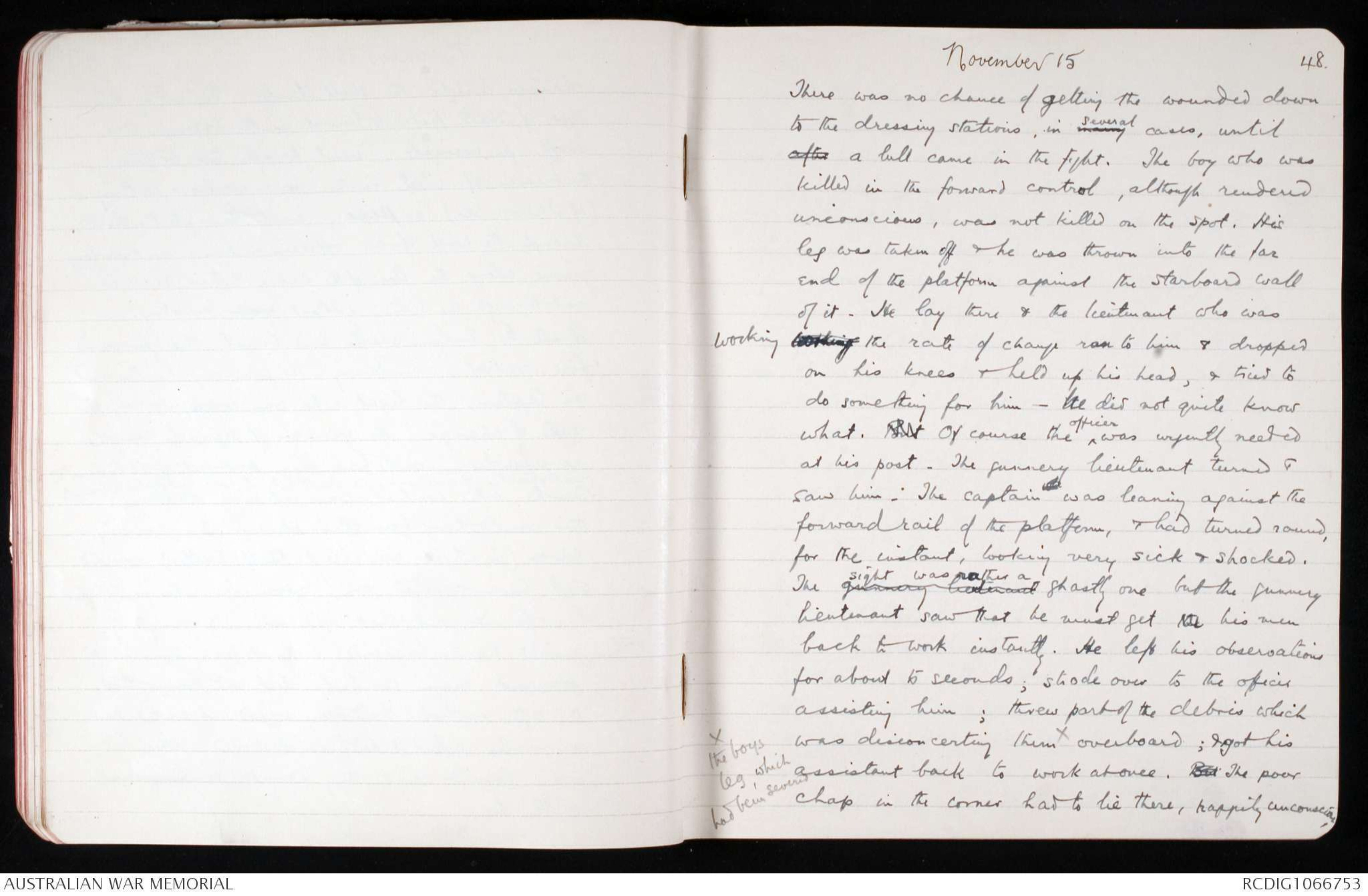
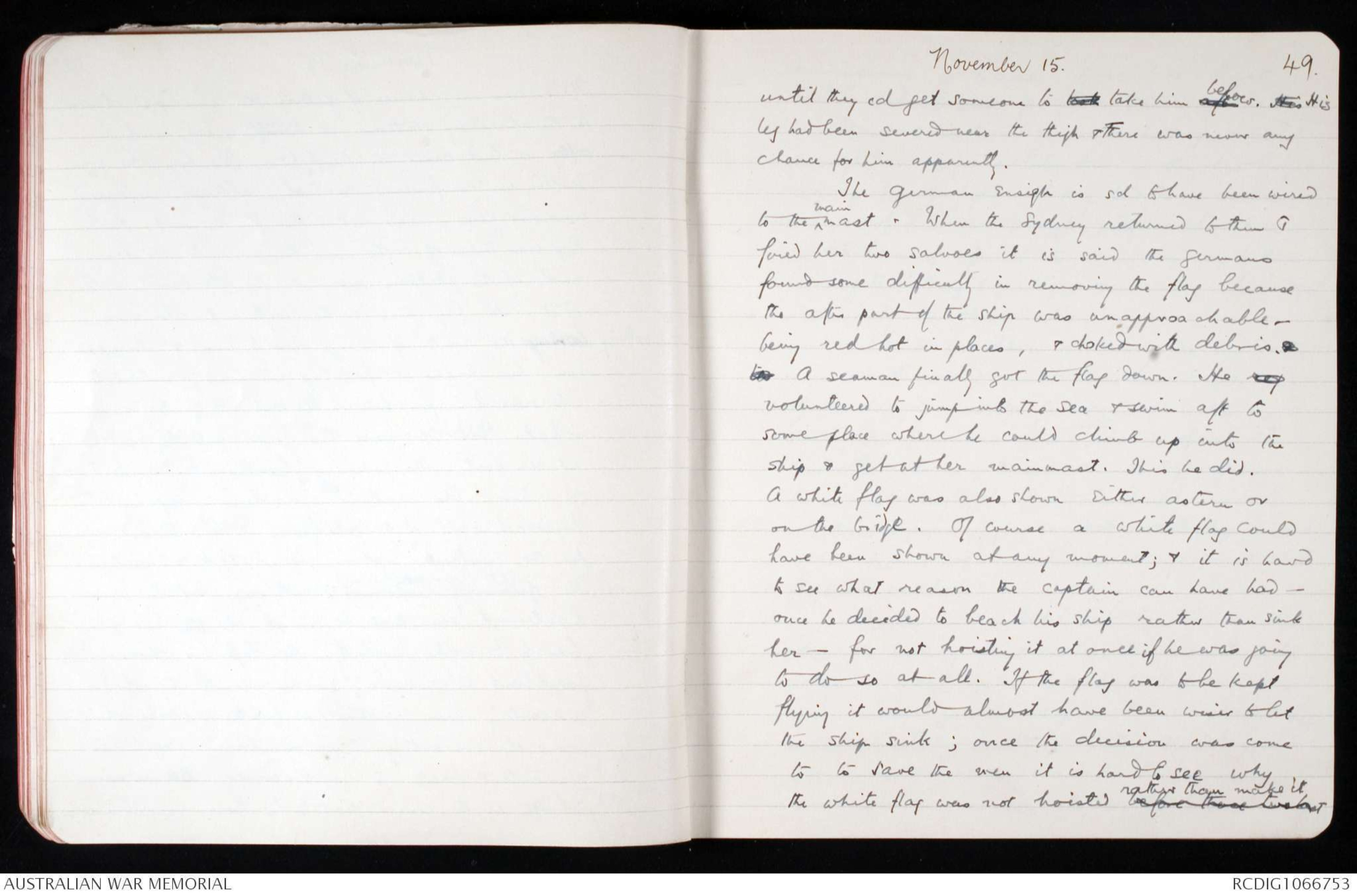
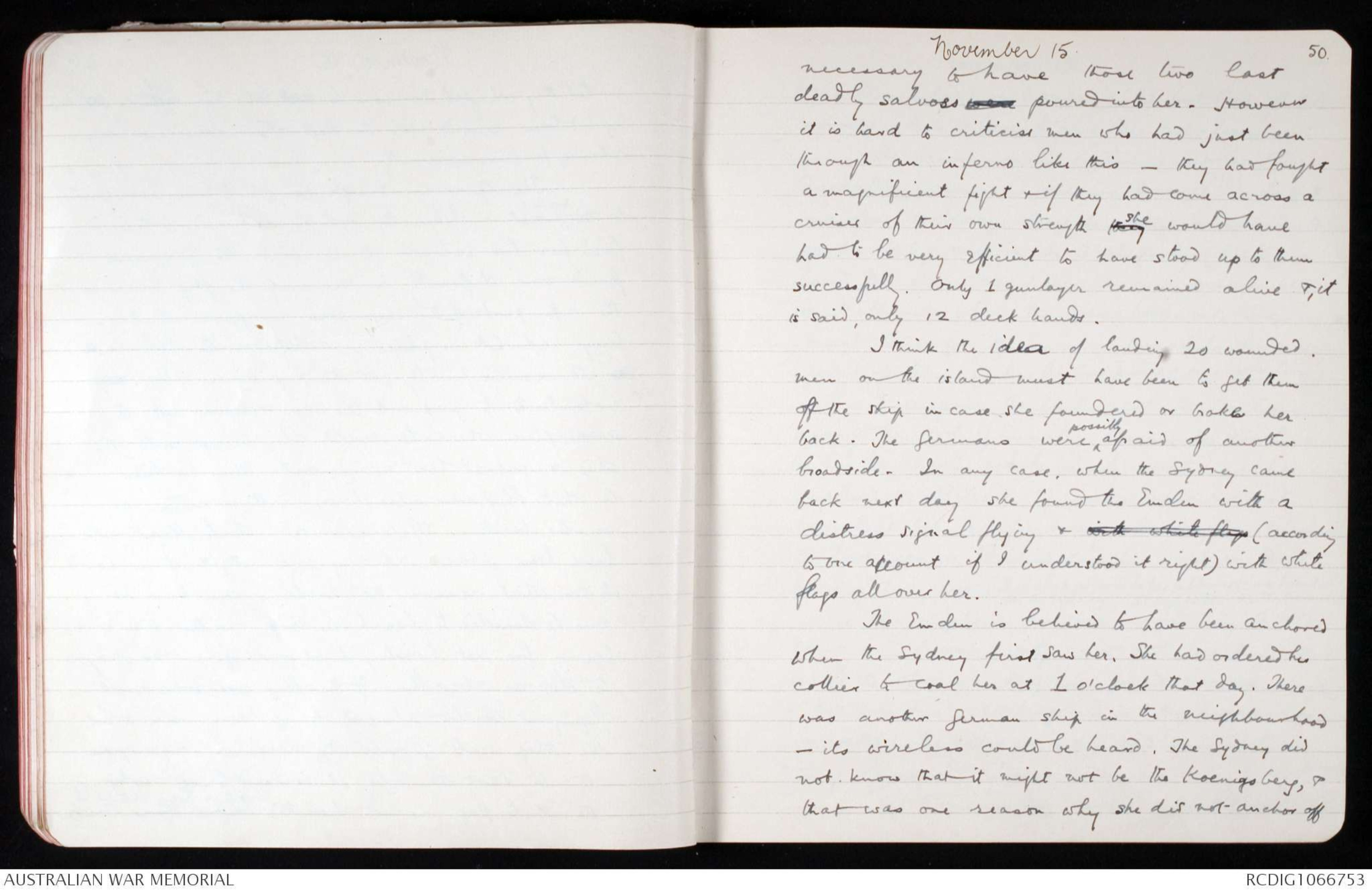
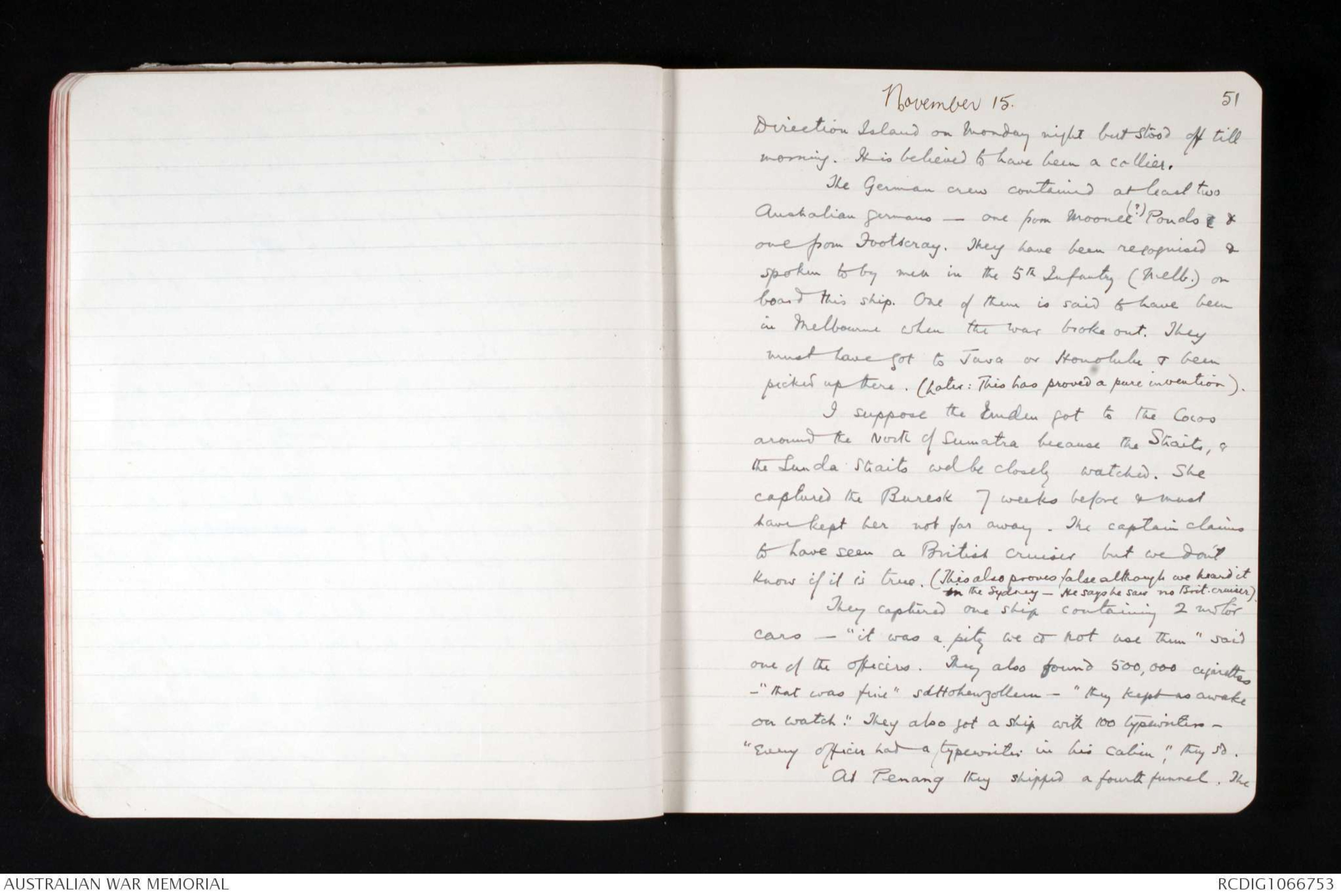
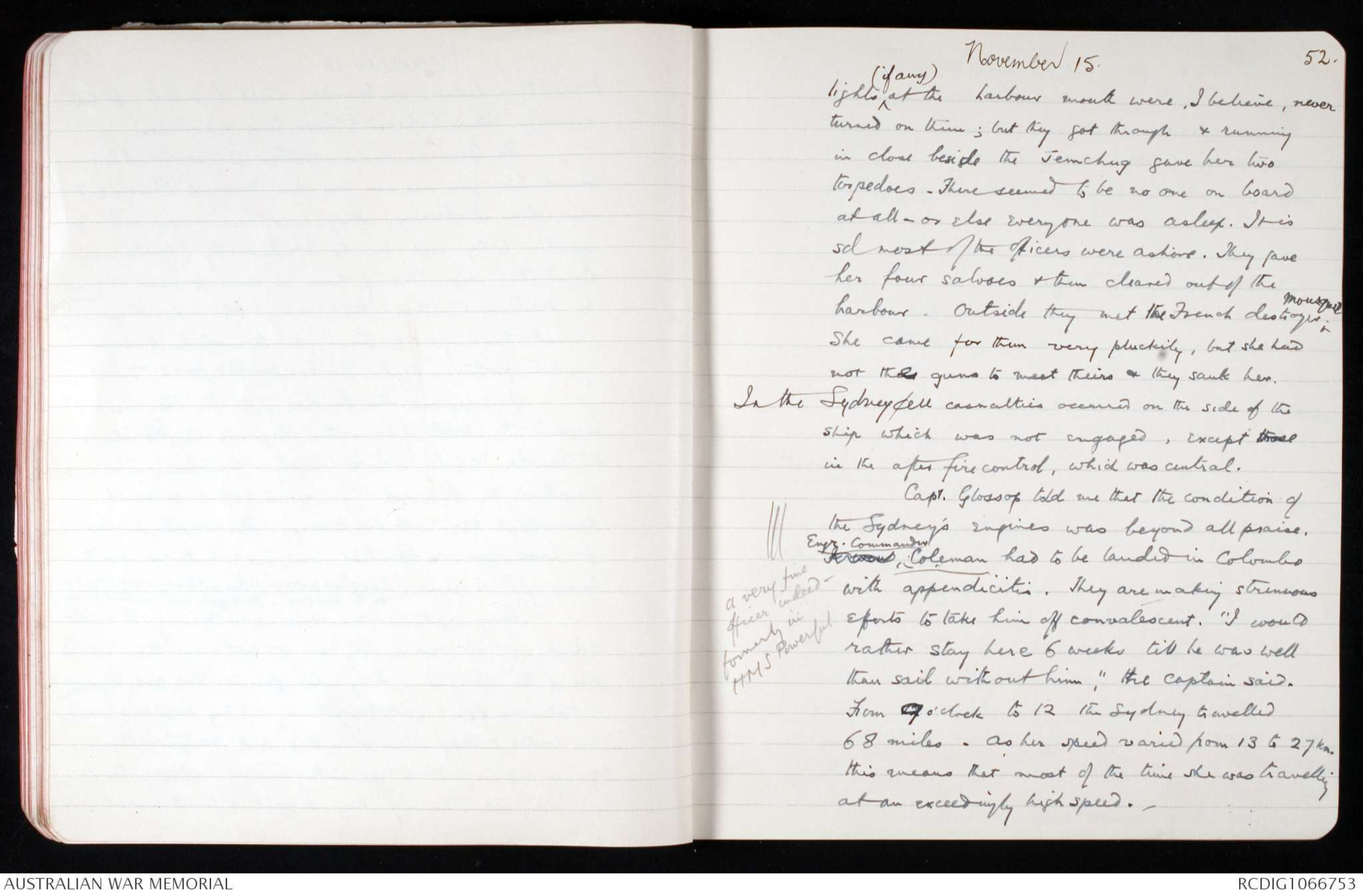
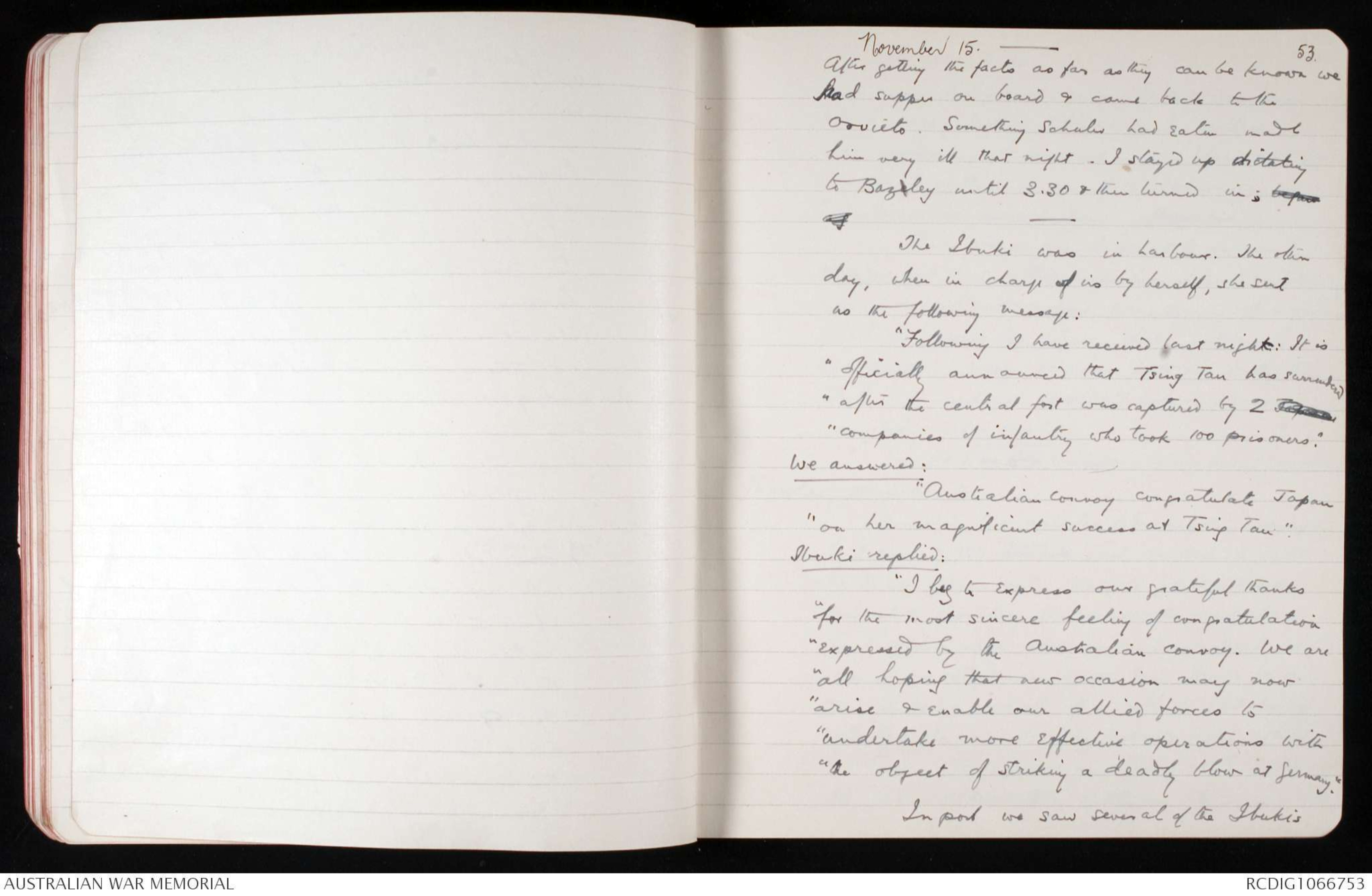
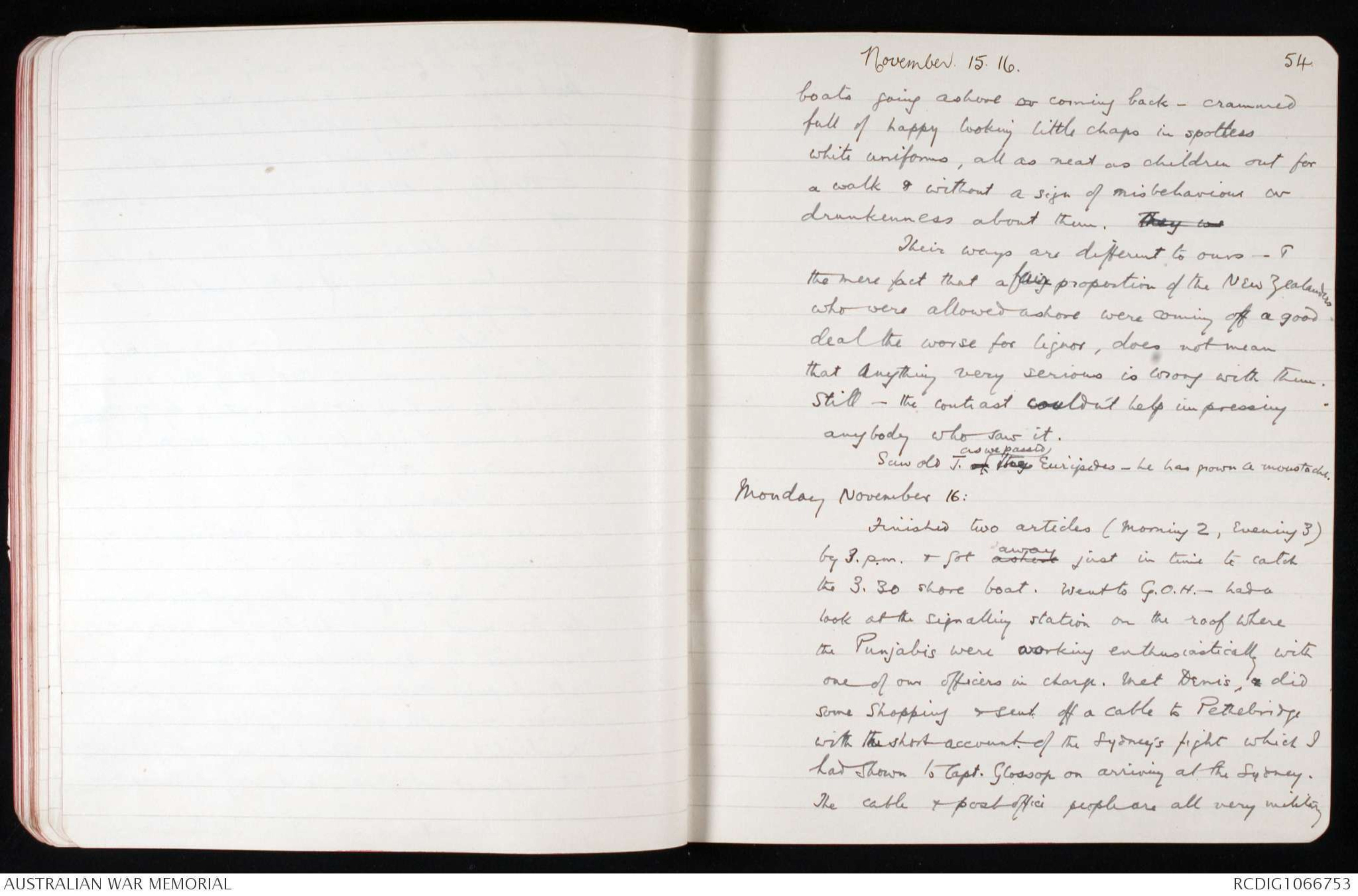
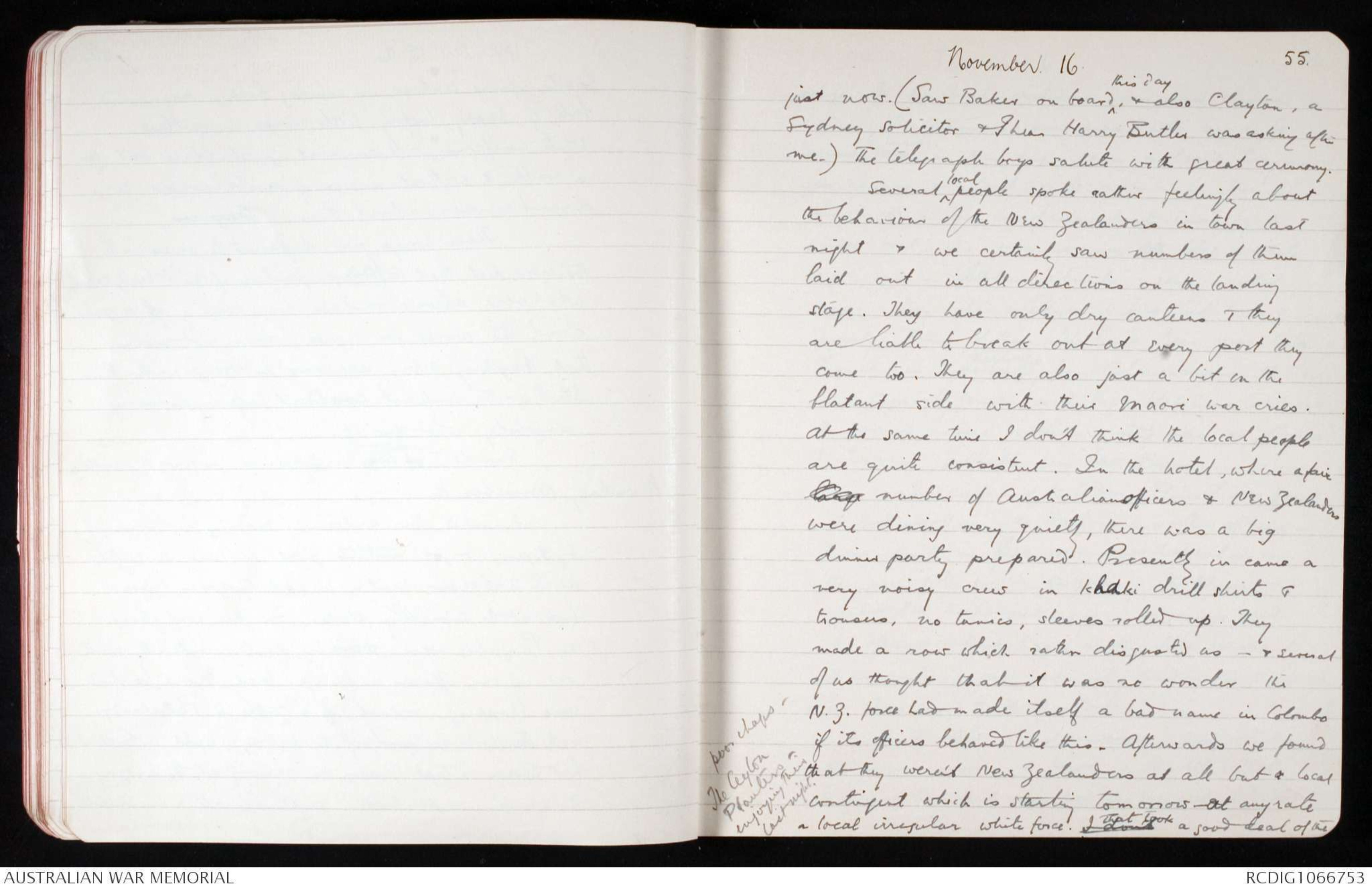
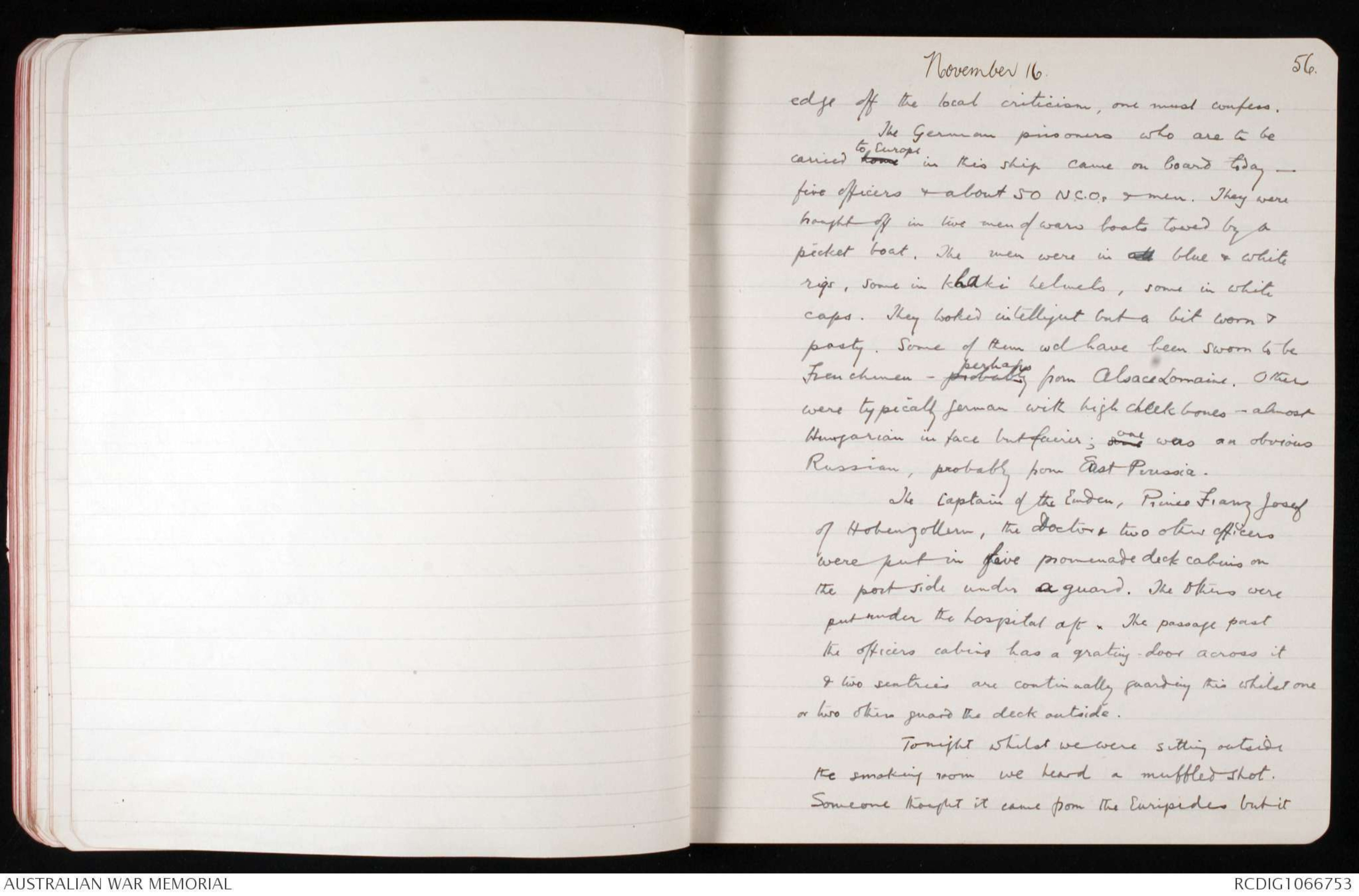
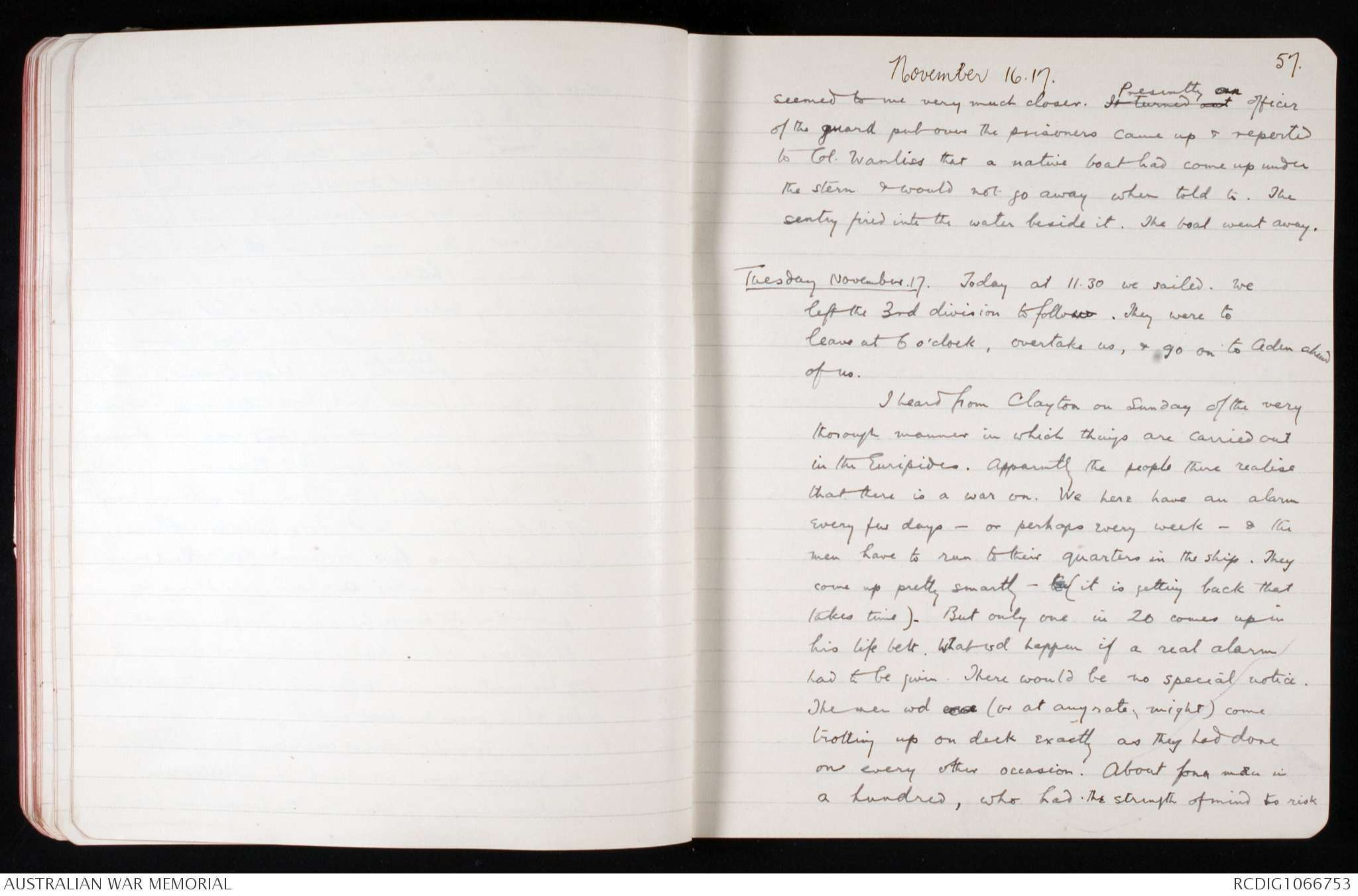
48.
November 15
There was no chance of getting the wounded down
to the dressing stations, in many several cases, untilafter a lull came in the fight. The boy who was
killed in the forward control, although rendered
unconscious, was not killed on the spot. His
leg was taken off & he was thrown into the far
end of the platform against the starboard wall
of it. He lay there on & the lieutenant who was
working working the rate of change ran to him & dropped
on his knees & held up his head, & tried to
do something for him - he did not quite know
what. But Of course the ^officer was urgently needed
at his post. The gunnery lieutenant turned &
saw him: The captain wh was leaning against the
forward rail of the platform, & had turned round,
for the instant, looking very sick & shocked.
The gunnery lieutenant sight was rather a ghastly one but the gunnery
lieutenant saw that he must get all his men
back to work instantly. He left his observations
for about 15 seconds; strode over to the officer
assisting him ; threw part of the debris which
was disconcerting them * overboard; & got his
assistant back to work at once. But The poor
chap in the corner had to lie there, happily unconscious,
[*the boys leg, which had been severed*]
49.
November 15.
until they cd get someone to took take him after below. His His
leg had been severed near the thigh & there was never any
chance for him apparently.
The German Ensign is sd to have been wired
to the main mast. When the Sydney returned to them &
fired her two salvoes it said the Germans
found some difficulty in removing the flag because
the after part of the ship was unapproachable –
being red hot in places, & choked with debris. &too A seaman finally got the flag down. He rep
volunteered to jump into the sea & swim aft to
some place where he could climb up into the
ship & get at her mainmast. This he did.
A white flag was also shown either astern or
on the bridge. Of course a white flag could
have been shown at any moment; & it is hard
to see what reason the captain can have had –
once he decided to beach his ship rather than sink
her - for not hoisting it at once if he was going
to do so at all. If the flag was to be kept
flying it would almost have been wiser to let
the ship sink; once the decision was come
to to save the men it is hard to see why
the white flag was not hoisted before those two last rather than make it
50.
November 15.
necessary to have those two last
deadly salvoes were poured into her. However
it is hard to criticise men who had just been
through inferno like this - they had fought
a magnificent fight & if they had come across a
cruiser of their own strength they she would have
had to be very efficient to have stood up to them
successfully. Only 1 gunlayer remained alive &, it
is said, only 12 deck hands.
I think the idea of landing 20 wounded.
men on the island must have been to get them
off the skip in case she foundered or broke her
back. The Germans were ∧possibly afraid of another
broadside. In any case, when the Sydney came
back next day she found the Emden with a
distress signal flying & with white flags (according
to one account if I understood it right) with white
flags all over her.
The Emden is believed to have been anchored
when the Sydney first saw her. She had ordered her
collier to coal her at 1 o'clock that day. There
was another German ship in the neighbourhood –
- its wireless could be heard. The Sydney did
not know that it might not be the Koenigsberg, &
that was one reason why she did not anchor off
51
November 15.
Direction Island on Monday night but stood off till
morning. It is believed to have been a collier.
The German crew contained at least two
Australian Germans – one from Moonee(?) Ponds a &
one from Footscray. They have been recognised &
spoken to by men in the 5th Infantry (Melb.) on
board this ship. One of them is said to have been
in Melbourne when the war broke out. They
must have got to Java or Honolulu & been
picked up there. (Later: This has proved a pure invention).
I suppose the Emden got to the Cocos
around the North of Sumatra because the Straits, &
the Sunda Straits wd be closely watched. She
captured the Buresk 7 weeks before & must
have kept her not far away. The captain claims
to have seen a British cruiser but we don't
know if it is true. (This also proves false although we heard it
on the Sydney - He says he saw no Brit. cruiser).
They captured one ship containing 2 motor
cars - "it was a pity we cd not use them " said
one of the officers. They also found 500,000 cigarettes
- "that was fine" sd Hohenzollern - "they kept us awake
on watch! They also got a ship with 100 typewriters -
"Every officer had a typewriter in his cabin," they sd.
At Penang they shipped a fourth funnel. The
52.
November 15.
lights ∧(if any) at the harbour mouth were, I believe, never
turned on there ; but they got through & running
in close beside the Jemchug gave her two
torpedoes. There seemed to be no one on board
at all - or else everyone was asleep. It is
sd most of the officers were ashore. They gave
her four salvoes & then cleared out of the
harbour. Outside they met the French destroyer Mousquet.
She came for them very pluckily, but she had
not thex guns to meet theirs & they sank her.
In the Sydney all casualties occurred on the side of the
ship that was not engaged, except those
in the after fire control, which was central.
Capt. Glossop told me that the condition of
the Sydney's engines was beyond all praise. I was ^Engr. Commander Coleman had to be landed in Colombo
[*a very fine officer indeed- formerly in HMS Powerful*]
with appendicitis. They making strenuous
efforts to take him off convalescent. "I would
rather stay here 6 weeks till he was well
than sail without him," the captain said.
From 9 o'clock to 12 the Sydney travelled
68 miles . as her speed varied from 13 to 27 kn.
this means that most of the time she was travelling
at an exceedingly high speed. -
53.
November 15. ______
After getting the facts as far as they can be known we
had supper on board & came back to the
Orvieto. Something Schuler had eaten made
him very ill that night. I stayed up dictating
to Bazeley until 3.30 & then turned in ; beforeif- ________
The Ibuki was in harbour. The other
day, when in charge of us by herself, she sent
the following message:
"Following I have received last night: It is
“officially announced that Tsing Tan has surrendered
"after the central fort was captured by 2 Japan
"companies of infantry who took 100 prisoners”.
We answered:
"Australian Convoy congratulate Japan
"on her magnificent success at Tsing Tan".
Ibuki replied:
"I beg to express our grateful thanks
“for the most sincere feeling of congratulation
"Expressed by the Australian Convoy. We are
"all hoping that new occasion may now
“arise & enable our allied forces to
"undertake more effective operations with
"the object of striking a deadly with blow at Germany."
In port we saw several of the Ibukis
54
November. 15. 16.
boats going ashore or coming back - crammed
full of happy looking little chaps in spotless
white uniforms, all as neat as children out for
a walk & without a sign of misbehaviour or
drunkenness about them. They wer
Their ways are different to ours - &
the mere fact that a fair proportion of the New Zealanders
who were allowed ashore were coming off a good
deal the worse for liquor, does not mean
that anything very serious is wrong with them.
Still - the contrast couldn't help impressing
anybody who saw it.
Saw old J. ∧as we passed they Euripides - he has grown a moustache.
Monday November 16:
Finished two articles (morning 2, evening 3)
by 3. p.m. & got ashore away just in time to catch
the 3. 30 shore boat. Went to G.O.H.- had a
look at the signalling station on the roof where
the Punjabis were working enthusiastically with
one of our officers in charge. Met Denis, & did
some shopping & sent off a cable to Pethebridge
with the short account of the Sydney's fight which I
had shown to Capt. Glossop on arriving at the Sydney.
The cable & post office people are all very military
55
November. 16.
just now. (Saw Baker on board) ∧this day, & also Clayton, a
Sydney solicitor & I hear Harry Butler was asking after
me.) The telegraph boys salute with great ceremony.
Several ∧local people spoke rather feelingly about
the behaviour of the New Zealanders in town last
night & we certainly saw numbers of them
laid out in all directions on the landing
stage. They have only dry canteens & they
are liable to break out at every port they
come too. They are also just a bit in the
blatant side with their Maori war cries.
At the same time I don't think the local people
are quite consistent. In the hotel, where a fair large number of Australian officers & New Zealanders
were dining very quietly, there was a big
dinner party prepared. Presently in came a
very noisy crew in khaki drill shirts &
trousers, no tunics, sleeves rolled up. They
made a row which rather disgusted us - & several
of us thought that it was no wonder the
N.Z. force had made itself a bad name in Colombo
if its officers behaved like this. Afterwards we found
that they weren't New Zealanders at all but a local
contingent which is starting tomorrow -at any rate
a local irregular white force. I don’t That took a good deal of the
[*poor chaps. The Ceylon Planters - enjoying their last night.*]
56.
November 16.
edge off the local criticism, one must confess.
The German prisoners who are to be
carried home to Europe in this ship came on board today -
five officers & about 50 N.C.O,. & men. They were
brought off in two men of war boats towed by a
picket boat. The were in all blue & white
rigs, some in khaki helmets, some in white
caps. They looked intelligent but a bit worn &
pasty. Some of them wd have been sworn to be
Frenchmen – probably perhaps from Alsace Lorraine. Others
were typically German with high cheek bones - almost
Hungarian in face but fairer; some one was an obvious
Russian, probably from East Prussia.
The Captain of the Emden, Prince Franz Josef
of Hohenzollern, the Doctor & two other officers
were put in five promenade deck cabins on
the port side under a guard. The others were
put under the hospital aft. The passage past
the officers cabins has a grating door across it
& two sentries are continually guarding this whilst one
or two others guard the deck outside.
Tonight whilst we were sitting outside
the smoking room we heard a muffled shot.
Someone thought it came from the Euripides but it
57.
November 16.17.
seemed to me very much closer. It turned out Presently an officer
of the guard put over the prisoners came up & reported
to Col. Wanliss that a native boat had come up under
the stern & would not go away when told to. The
sentry fired into the water beside it. The boat went away.
Tuesday November 17. Today at 11.30 we sailed. We
left the 3rd division to follow. They were to
leave at 6 o'clock, overtake us, & go on to Aden ahead
of us.
I heard from Clayton on Sunday of the very
thorough manner in which things are carried out
in the Euripides. Apparently the people there realise
that there is a war on. We here have an alarm
every few days - or perhaps every week - & the
men have to run to their quarters in the ship. They
come up pretty smartly- bu (it is getting back that
takes time). But only one in 20 comes up in
his life belt. What wd happen if a real alarm
had to be given. There would be no special notice.
The men wd come (or at any rate, might) come
trotting up on deck exactly as they had done
on every other occasion. About four men in
a hundred, who had the strength of mind to risk
 Diane Ware
Diane WareThis transcription item is now locked to you for editing. To release the lock either Save your changes or Cancel.
This lock will be automatically released after 60 minutes of inactivity.